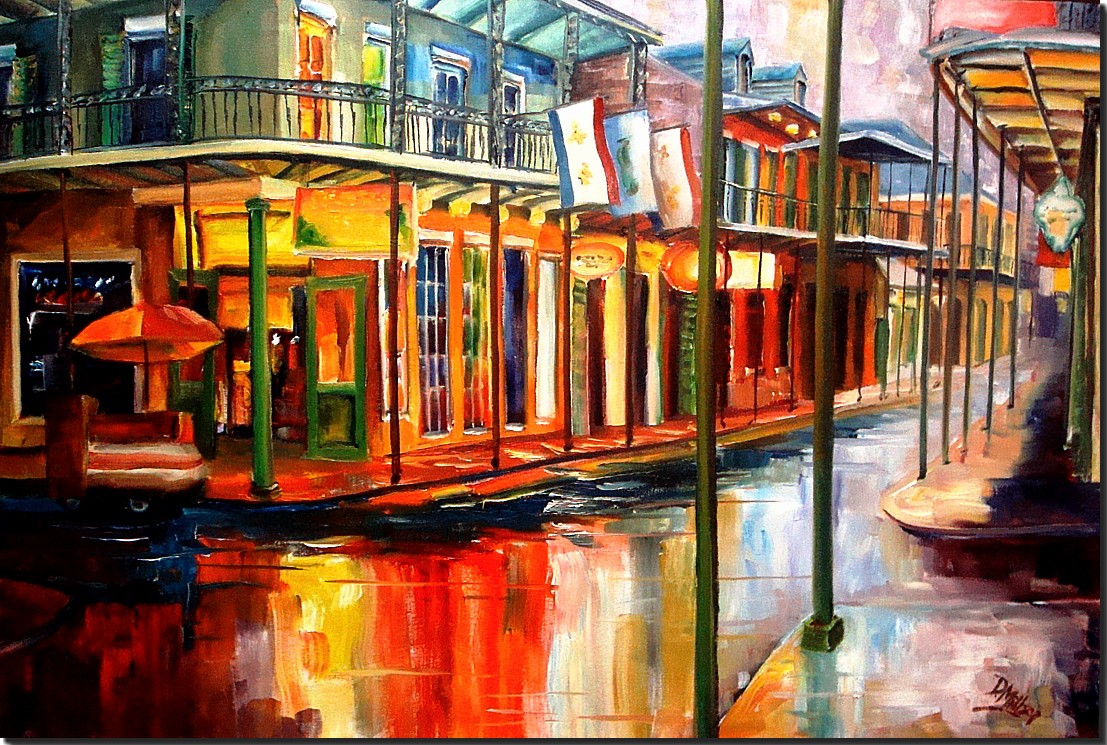Serendip is an independent site partnering with faculty at multiple colleges and universities around the world. Happy exploring!
The City


(“Downpour on Bourbon Street” by Diane Millsap)
Whether one considers New Orleans or New York City, some concepts a City hold true. The city is huge and vast and crowded, nothing quite so much as a humongous hidden object game, rivers of nameless faces in nameless places going about their unknown businesses. Here and there are bright faces and familiar places from fond memories or exciting opportunities. A museum, a zoo, a bakery, a mahjong game-- the city is a sugar rush. Tasty and often ending in an energy crash, which never forestalls the next rush. The city is amazing for its opportunities, adventures, the stories lucking on every street corner and every stranger’s eye. The city is exhausting- constant lights, sights, sounds, the unending press of people. Even the exhaustion can be exhilarating; there is nothing quite like when the city starts to sing, when the car horns and twinkling lights make up an impromptu extravaganza. Although cities are often draining, they are fun and terrific places to spend time go on adventures.
Cities are not perfect; they are loud, they are bright, they are crowded, they can be overwhelming. They usually are smelly and dirty, many of the people you meet on the street range from unfriendly to outright dubious, and it is incredibly easy to get lost. That all said, the benefits of the city far outweigh the negatives. Cities are loud, yes, but the noise is often exciting, as surely the hum of life as any heart beat. Cities are bright; the better to marvel at. There are often crowds, but not always; even when the crowds surge, it is usually simple enough to not get swept up, and the people-watching opportunities are marvelous. Here a man sells pictures with his tie-dyed rats, there a woman reads a script and prepares for her audition, across the way is a disaffected child headed heading to the last place she wants to be, wherever that may be. They may be smelly and dirty, but that makes gardens, parks, the insides of buildings all the more pleasant to enter; it forces the visitor to live in the moment more than they might have otherwise and enjoy how good it feels to enter this clean space. Strangers in cities can range from unremarkable to frightening, but they can also be the best conversation partners, the most interesting people to watch or interact with. Further, the ease in which one can get lost in a city is sometimes their best asset; the better to find the places you would otherwise have missed, talk to the people and visit the museums and enjoy the little holes-in-the-wall eateries. Cities can be overwhelming, but the fact that something is overwhelming does not always mean that it is not fun.
The best thing about cities has to be all the opportunities. There are constantly moments wherein something unexpected and wonderful could potentially happen. The hidden museums one never knew existed, or the little stores with fascinating merchandise. The wonderful food shops hidden hear and there, and the pockets of amazing humanity here and there. Thought-provoking graffiti, or a historically protected building, a street-corner artist or food stall, even something as simple as a particularly interesting face can make a trip to the city worth it. What is more, the more exposure one has to a city, the fewer negative side affects come with visiting or living in the city.
The cities that I feel closest two, spend the most time in, are New Orleans and New York City. My paternal grandmother lives in the French Quarter, and I adore the history, the community, the wonderful experiences attached to that place for me. It is associated with fascinating history, much of which my grandmother’s practiced eye can point out on a casual walk. “Here is the fine craftsmanship on the railings; that remains from when New Orleans was French. Here are the docks that made New Orleans such a tactically important city; the Orleansians hated the Americans when they came to port, because they always seemed so crude and rude. Did I ever tell you about that time New Orleans changed nationality three times in three months? None of the inhabitants went with it; they continued along as if they were still French the whole way through.”
New York, on the other hand, was the birthplace and home of my mother and her family; she grew up in that city, and will always be a New Yorker at heart. She taught me how to orient myself from the World Trade Center, how to operate the subway systems, where the best places to get food or craft supplies were, where were the best museums and how to best make use of them. She taught me how to react when a crowd loomed, when someone was pitching a spiel, any street-savvy I have learnt, I learnt in New York.
These are the reasons I love the city; despite any flaws it may have, its benefits can not help but shine through.


